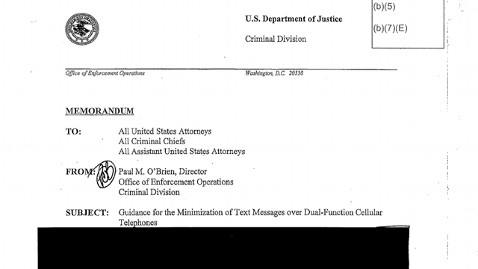Justice Department Complies With FOIA By Releasing Completely Redacted Document

The Justice Department responded to an ACLU request with a heavily redacted document. Credit: ACLU
Yes, the Department of Justice complied with the letter of the law and responded to a Freedom of Information Act request from the ACLU seeking insight into the Obama Administration's policy on intercepting text messages from cell phones.
But no, it didn't release any actual information. Or even any words or letters. As one Reddit comment put it, "[the document is] so transparent it's completely invisible."
Instead, the Justice Department released 15 pages that were entirely redacted - shaded over in heavy black from top to bottom.
All that was visible is the subject of the memo: "Guidance for the Minimization of Text Messages over Dual-Function Cellular Telephones"
It is all part of a larger legal battle between civil rights activists and the federal law enforcement about electronic communications. The ACLU has argued that current government surveillance practices on electronic communications violate citizens' Fourth Amendment rights, which are meant to protect Americans from unlawful searches and seizures. With the FOIA request they were trying to determine if the FBI had properly complied with a 2010 appeals court decision that concerned when email providers must turn over messages to law enforcement and whether the guidelines apply to text messages.
View the full FOIA response here.
"The documents show that despite a federal appeals court ruling that under the Fourth Amendment, investigators must get a warrant before reading people's emails, the FBI has apparently not been getting warrants to do so, and the policy of U.S. Attorneys' offices appears to vary by location," ACLU spokesperson, Josh Bell told ABC News in an email.
ACLU attorney Nathan Wessler further explained their position in a recent blog post.
The documents provided to the ACLU regarding FBI policies, he wrote, do not outwardly state whether or not government agents are required to get warrants to access all electronic communications. According to the FBI's Domestic Investigations and Operations Guide, agents are only required to have warrants for electronic communications that have been unopened and are less than 180 days old, suggesting that older or opened communications could be fair game and prompting ACLU's FOIA request.
"We got very little information about the policy on text messages," Bell said regarding the FOIA request. "[The document] does not even show the date, let alone what the policy is."
In April, the Senate Judiciary Committee voted to update the Electronic Communications Privacy Act, which will aim to close the warrant loopholes currently affecting online communication policies.
Related: Supreme Court Rejects Secret Surveillance Challenge